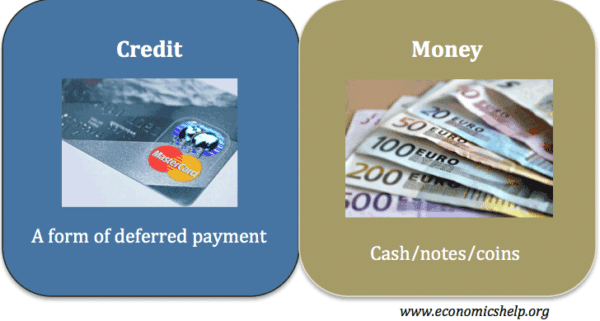Readers Question: In simple terms what is the difference between credit and money?
Credit
Credit is any form of deferred payment. For example, if you purchase on a credit card – a bank effectively pays on your behalf – anticipating you will pay back the amount to the credit card company in six weeks time.
If a bank lends money to a consumer, this is a form of credit. The consumer is given money, which it later has to pay back to the bank.
Money
Money is any item or electronic record that can be used for the purchase of goods, provide a store of account, and can be used as a medium of exchange.
If you buy on a debit card, you are using actual money in your bank account. You have a certain amount, and once your bank account is depleted, you can’t spend any more money. People will accept your money as legal tender in that country.
Example of difference between money and credit
If you buy on a credit card, the amount you can spend depends on the generosity of your credit card company. For example, you may spend £3,000 on credit (money you may or not have). However, the credit card company may decide to increase the amount of credit that it gives you, it can increase your credit card limit to £5,000 and more credit is created. But, you have to pay this back. This credit is not negotiable; you can’t go to a shop and directly offer them some of your credit card limit.
You can’t increase the amount of money you have (without earning it), but you can increase the amount of credit you receive – if banks are willing to lend it to you. In this sense, you could think of money as more tangible, and credit is more intangible.
As a youngster, you will be told ‘money doesn’t grow on trees’. You can’t personally create money out of thin air.
But credit in a way can be created out of thin air. If a bank decides to lend you more.
Using credit to get more money
A slight complication is that you could use a credit card to withdraw cash. You are borrowing money on credit. By withdrawing money from a credit card machine – you can spend this money, increasing the money supply in the economy. However, the difference is that because you received this money on credit, you have to pay it back.
If you withdraw cash from your debit account – money you received for wages, you don’t have to worry about paying this money back – it was yours in the first place.
Example of Money and Credit
Suppose you have been paid £200 cash. You could deposit this money in a bank. This £200 cash is money because it is universally accepted as a form of payment.
The bank then has a deposit of £200. The bank has assets of £200 (the cash) and also liabilities to you (you can ask for your deposits back.)
Bank Lending
Suppose that the bank decides to lend some of your deposits to another customer. It could give a loan to a business. This loan is an example of credit.
Related


Very intresting chapter
Thanks for the information. It helped me alot to complete my project.
Yes it is true that money and credit is quit an interesting chapter . It is related to our economical background .
Very useful and proper definition.
Plz give me more information about a
Necessary step for development
It is very interesting chapter and very good